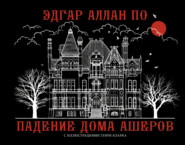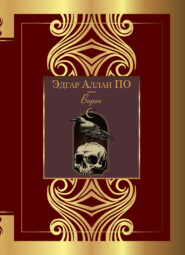По всем вопросам обращайтесь на: info@litportal.ru
(©) 2003-2025.
✖
The Works of Edgar Allan Poe – Volume 5
Настройки чтения
Размер шрифта
Высота строк
Поля
Thus, although in a very cursory and imperfect manner, I have endeavored to convey to you my conception of the Poetic Principle. It has been my purpose to suggest that, while this principle itself is strictly and simply the Human Aspiration for Supernal Beauty, the manifestation of the Principle is always found in an elevating excitement of the soul, quite independent of that passion which is the intoxication of the Heart, or of that truth which is the satisfaction of the Reason. For in regard to passion, alas! its tendency is to degrade rather than to elevate the Soul. Love, on the contrary – Love – the true, the divine Eros – the Uranian as distinguished from the Diona an Venus – is unquestionably the purest and truest of all poetical themes. And in regard to Truth, if, to be sure, through the attainment of a truth we are led to perceive a harmony where none was apparent before, we experience at once the true poetical effect; but this effect is referable to the harmony alone, and not in the least degree to the truth which merely served to render the harmony manifest.
We shall reach, however, more immediately a distinct conception of what the true Poetry is, by mere reference to a few of the simple elements which induce in the Poet himself the poetical effect He recognizes the ambrosia which nourishes his soul in the bright orbs that shine in Heaven – in the volutes of the flower – in the clustering of low shrubberies – in the waving of the grain-fields – in the slanting of tall eastern trees – in the blue distance of mountains – in the grouping of clouds – in the twinkling of half-hidden brooks – in the gleaming of silver rivers – in the repose of sequestered lakes – in the star-mirroring depths of lonely wells. He perceives it in the songs of birds – in the harp of Bolos – in the sighing of the night-wind – in the repining voice of the forest – in the surf that complains to the shore – in the fresh breath of the woods – in the scent of the violet – in the voluptuous perfume of the hyacinth – in the suggestive odour that comes to him at eventide from far distant undiscovered islands, over dim oceans, illimitable and unexplored. He owns it in all noble thoughts – in all unworldly motives – in all holy impulses – in all chivalrous, generous, and self-sacrificing deeds. He feels it in the beauty of woman – in the grace of her step – in the lustre of her eye – in the melody of her voice – in her soft laughter, in her sigh – in the harmony of the rustling of her robes. He deeply feels it in her winning endearments – in her burning enthusiasms – in her gentle charities – in her meek and devotional endurances – but above all – ah, far above all, he kneels to it – he worships it in the faith, in the purity, in the strength, in the altogether divine majesty – of her love.
Let me conclude by – the recitation of yet another brief poem – one very different in character from any that I have before quoted. It is by Motherwell, and is called “The Song of the Cavalier.” With our modern and altogether rational ideas of the absurdity and impiety of warfare, we are not precisely in that frame of mind best adapted to sympathize with the sentiments, and thus to appreciate the real excellence of the poem. To do this fully we must identify ourselves in fancy with the soul of the old cavalier: —
Then mounte! then mounte, brave gallants all,
And don your helmes amaine:
Deathe’s couriers. Fame and Honor call
No shrewish teares shall fill your eye
When the sword-hilt’s in our hand, —
Heart-whole we’ll part, and no whit sighe
For the fayrest of the land;
Let piping swaine, and craven wight,
Thus weepe and poling crye,
Our business is like men to fight.
OLD ENGLISH POETRY[5 - “Book of Gems,” Edited by S. C. Hall]
IT should not be doubted that at least one-third of the affection with which we regard the elder poets of Great Britain should be-attributed to what is, in itself, a thing apart from poetry-we mean to the simple love of the antique-and that, again, a third of even the proper poetic sentiment inspiredby their writings should be ascribed to a fact which, while it has strict connection with poetry in the abstract, and with the old British poems themselves, should not be looked upon as a merit appertaining to the authors of the poems. Almost every devout admirer of the old bards, if demanded his opinion of their productions, would mention vaguely, yet with perfect sincerity, a sense of dreamy, wild, indefinite, and he would perhaps say, indefinable delight; on being required to point out the source of this so shadowy pleasure, he would be apt to speak of the quaint in phraseology and in general handling. This quaintness is, in fact, a very powerful adjunct to ideality, but in the case in question it arises independently of the author’s will, and is altogether apart from his intention. Words and their rhythm have varied. Verses which affect us to-day with a vivid delight, and which delight, in many instances, may be traced to the one source, quaintness, must have worn in the days of their construction, a very commonplace air. This is, of course, no argument against the poems now-we mean it only as against the poets thew. There is a growing desire to overrate them. The old English muse was frank, guileless, sincere, and although very learned, still learned without art. No general error evinces a more thorough confusion of ideas than the error of supposing Donne and Cowley metaphysical in the sense wherein Wordsworth and Coleridge are so. With the two former ethics were the end-with the two latter the means. The poet of the “Creation” wished, by highly artificial verse, to inculcate what he supposed to be moral truth-the poet of the “Ancient Mariner” to infuse the Poetic Sentiment through channels suggested by analysis. The one finished by complete failure what he commenced in the grossest misconception; the other, by a path which could not possibly lead him astray, arrived at a triumph which is not the less glorious because hidden from the profane eyes of the multitude. But in this view even the “metaphysical verse” of Cowley is but evidence of the simplicity and single-heartedness of the man. And he was in this but a type of his school-for we may as well designate in this way the entire class of writers whose poems are bound up in the volume before us, and throughout all of whom there runs a very perceptible general character. They used little art in composition. Their writings sprang immediately from the soul-and partook intensely of that soul’s nature. Nor is it difficult to perceive the tendency of this abandon-to elevate immeasurably all the energies of mind-but, again, so to mingle the greatest possible fire, force, delicacy, and all good things, with the lowest possible bathos, baldness, and imbecility, as to render it not a matter of doubt that the average results of mind in such a school will be found inferior to those results in one (ceteris paribus) more artificial.
We can not bring ourselves to believe that the selections of the “Book of Gems” are such as will impart to a poetical reader the clearest possible idea of the beauty of the school-but if the intention had been merely to show the school’s character, the attempt might have been considered successful in the highest degree. There are long passages now before us of the most despicable trash, with no merit whatever beyond that of their antiquity.. The criticisms of the editor do not particularly please us. His enthusiasm is too general and too vivid not to be false. His opinion, for example, of Sir Henry Wotton’s “Verses on the Queen of Bohemia" – that “there are few finer things in our language,” is untenable and absurd.
In such lines we can perceive not one of those higher attributes of Poesy which belong to her in all circumstances and throughout all time. Here every thing is art, nakedly, or but awkwardly concealed. No prepossession for the mere antique (and in this case we can imagine no other prepossession) should induce us to dignify with the sacred name of poetry, a series, such as this, of elaborate and threadbare compliments, stitched, apparently, together, without fancy, without plausibility, and without even an attempt at adaptation.
In common with all the world, we have been much delighted with “The Shepherd’s Hunting” by Withers – a poem partaking, in a remarkable degree, of the peculiarities of “Il Penseroso.” Speaking of Poesy the author says:
“By the murmur of a spring,
Or the least boughs rustleling,
By a daisy whose leaves spread,
Shut when Titan goes to bed,
Or a shady bush or tree,
She could more infuse in me
Than all Nature’s beauties can
In some other wiser man.
By her help I also now
Make this churlish place allow
Something that may sweeten gladness
In the very gall of sadness —
The dull loneness, the black shade,
That these hanging vaults have made
The strange music of the waves
Beating on these hollow caves,
This black den which rocks emboss,
Overgrown with eldest moss,
The rude portals that give light
More to terror than delight,
This my chamber of neglect
Walled about with disrespect;
From all these and this dull air
A fit object for despair,
She hath taught me by her might
To draw comfort and delight.”
But these lines, however good, do not bear with them much of the general character of the English antique. Something more of this will be found in Corbet’s “Farewell to the Fairies!” We copy a portion of Marvell’s “Maiden lamenting for her Fawn,” which we prefer-not only as a specimen of the elder poets, but in itself as a beautiful poem, abounding in pathos, exquisitely delicate imagination and truthfulness-to anything of its species:
“It is a wondrous thing how fleet
‘Twas on those little silver feet,
With what a pretty skipping grace
It oft would challenge me the race,
And when’t had left me far away
‘Twould stay, and run again, and stay;
For it was nimbler much than hinds,
And trod as if on the four winds.
I have a garden of my own,
But so with roses overgrown,
And lilies, that you would it guess
To be a little wilderness;
And all the spring-time of the year
It only loved to be there.
Among the beds of lilies I
Have sought it oft where it should lie,
Yet could not, till itself would rise,
Find it, although before mine eyes.
For in the flaxen lilies’ shade
It like a bank of lilies laid;
Upon the roses it would feed
Until its lips even seemed to bleed,
And then to me ‘twould boldly trip,
And print those roses on my lip,
But all its chief delight was still
With roses thus itself to fill,
And its pure virgin limbs to fold
In whitest sheets of lilies cold.
Had it lived long, it would have been
Lilies without, roses within.”
How truthful an air of lamentations hangs here upon every syllable! It pervades all.. It comes over the sweet melody of the words-over the gentleness and grace which we fancy in the little maiden herself-even over the half-playful, half-petulant air with which she lingers on the beauties and good qualities of her favorite-like the cool shadow of a summer cloud over a bed of lilies and violets, “and all sweet flowers.” The whole is redolent with poetry of a very lofty order. Every line is an idea conveying either the beauty and playfulness of the fawn, or the artlessness of the maiden, or her love, or her admiration, or her grief, or the fragrance and warmth and appropriateness of the little nest-like bed of lilies and roses which the fawn devoured as it lay upon them, and could scarcely be distinguished from them by the once happy little damsel who went to seek her pet with an arch and rosy smile on her face. Consider the great variety of truthful and delicate thought in the few lines we have quoted the wonder of the little maiden at the fleetness of her favorite-the “little silver feet” – the fawn challenging his mistress to a race with “a pretty skipping grace,” running on before, and then, with head turned back, awaiting her approach only to fly from it again-can we not distinctly perceive all these things? How exceedingly vigorous, too, is the line,
“And trod as if on the four winds!”
A vigor apparent only when we keep in mind the artless character of the speaker and the four feet of the favorite, one for each wind. Then consider the garden of “my own,” so overgrown, entangled with roses and lilies, as to be “a little wilderness” – the fawn loving to be there, and there “only” – the maiden seeking it “where it should lie” – and not being able to distinguish it from the flowers until “itself would rise” – the lying among the lilies “like a bank of lilies” – the loving to “fill itself with roses,”
“And its pure virgin limbs to fold
In whitest sheets of lilies cold,”
and these things being its “chief” delights-and then the pre-eminent beauty and naturalness of the concluding lines, whose very hyperbole only renders them more true to nature when we consider the innocence, the artlessness, the enthusiasm, the passionate girl, and more passionate admiration of the bereaved child —

















